
Economist Abhirup Sarkar does not mince his words. He is known for his inimical style, outspokenness, and though not too often liked by political honchos, is well respected by analysts and peers alike.
In a candid conversation with rediff.com, Sarkar, a professor of Indian Statistical Institute, Kolkata, analyses Left
Front rout in the Lok Sabha elections in May as also in the more recent by-elections against the state's economic perspective.
Excerpts:
When Trinamool Congress chief Mamata Banerjee's unrelenting protest against 'illegal acquisition' of farm land for Tatas' Nano factory at Singur forced the automobile major to move out of Bengal, political pundits had predicted that the move would cost TMC dear in the 2009 Lok Sabha election. But the pundits were proved wrong as TMC romped home with a sweeping victory. Do you think Mamata was right or the Left utterly wrong as far as their land policy is concerned?
It would not be proper to say that Mamata Banerjee's stand was right or that the Left policy was wrong. It was popular perception that got reflected in the election results.
Middle class Bengalis, as a general rule, are inspired by the Left ideology. They have a tendency to look upon the downtrodden with sympathy.
Naturally, the middle class did not approve of the forceful acquisition of farmers' land for the sake of industrialisation.
The Left made a major miscalculation in this respect. They failed to gauge the public pulse.
Before Lok Sabha election results were out, Rabin Deb, Left Front candidate from South Kolkata constituency (pitted against Mamata), came to visit me. He was absolutely certain of his win and even predicted the margin. But all these calculations went haywire.
Lok Sabha results proved that the fate of the Nano factory in Singur had failed to have any impact on the people.
Moreover, the people of this state had grown thoroughly disgruntled with the 32-year Left rule. They were sick and tired of inefficiency and nepotism of the Left Front rule. They expressed themselves through ballots.
...
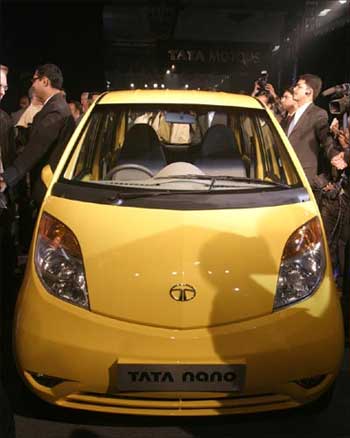
But the Nano factory could have generated jobs. Wouldn't it have dealt with the problem of unemployment to some extent?
It could have. But then let's not forget a huge number of factories in Bengal suffered closure because of Left-backed unions' movements. The people of the state were seething with discontent. They refused to risk their present for an uncertain future.
What, according to you, were the loopholes of the land acquisition policy adopted by the Left?
As I said, the Left failed to understand what the people wanted. In their mad and illogical rush for industrialisation, they could not come up with an effective measure to strike a balance between agriculture and industry.
Therefore, their acquisition policies seemed 'confused' to the people and they could not accept them.
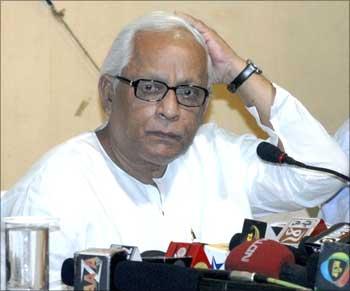
In the 2004 Lok Sabha election, it was 'brand Buddha' that helped Left win a thumping victory. What made people throw the same brand out so soon?
Chief Minister Buddhadev Bhattacharjee is a man of positive intention. He was pro-industrialisation and had a lot of aspirations about improving West Bengal.
But we must realise that the Left Front was enjoying its power in Bengal for more than three decades without paying any attention to industrialisation.
Soon after the 'brand Buddha' term was coined and process of industrialisation set foot in the state, veteran Left leaders started saying that the farmers were no longer interested to stay in the villages. Here too, the Left leaders committed a mistake.
They failed to realise that it were the affluent farmers, say, hailing from the Bardhaman district, who aspired to come out of the villages but the marginalised ones belonging to Purulia or Bankura districts did not want to leave their places of origin.
Hence, the 'dream of industrialisation' appealed to only a handful of people, the so-called creamy layer; it had hardly any appeal for the masses.
Also, soon after industrialisation was initiated, only the Left loyalists won important contracts and deals. New factory owners needed to buy necessary materials from syndicates run by the Left's 'own people'.
In fact, when the Nano factory was being built in Singur, insiders informed me that often materials had to be bought at thrice or four times the original price.
Isn't it natural, therefore, that people grew tired of such an industrialisation which brought the benefits to only the Left supporters?
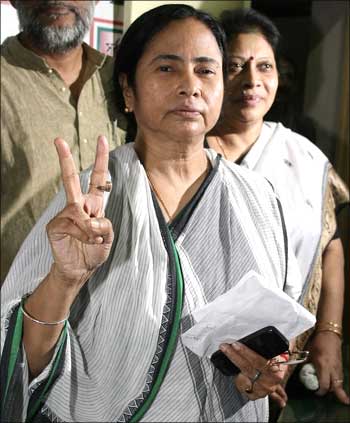
What is the economic implication of repeated TMC win - from the Lok Sabha polls to the most recent by-elections?
It is too soon to talk about an economic implication but politically speaking, a change, no matter what, is absolutely necessary.
It is not healthy for any state to have the same governance for more than three decades. Without getting into the debate if the change is for the better or for worse, it will be wise to welcome it.
In a debate organised by a Kolkata-based English daily last week, you stood by the motion that it is almost impossible to improve or change the state of Bengal. Why do you feel that way?
(Smiles). It was just a debate. There one just needs to speak for and against a motion. What one says standing on the dais does not necessarily have to evolve out of that person's conviction.
However, I do feel it is difficult, though not impossible, to achieve an economic improvement.
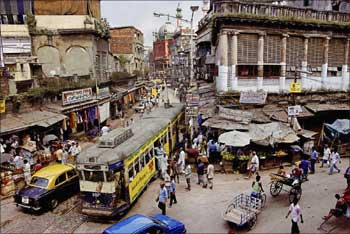
What actually ails Bengal's economy?
There are many factors. But the foremost is a huge debt. About 97 per cent of Bengal's revenue is spent on paying interests for loans and also for salaries. The rest 3 per cent is used for development. It is too meager an amount. No wonder, therefore, the infrastructure of the state is in a shambles.
And the burden of debt is getting bigger with time.
Also, because of rampant nepotism practised by the Left, mediocrity became a way of life in Bengal.
Be it at the Writers' Building, universities or public sector units, almost each employee is selected not on the basis of qualifications but by virtue of his or her allegiance to the red bastion.
As a result, real talent ceased to be recognised in the state.
Do you think the 'winds of change' we are witnessing now in Bengal will get transformed into an economic revival?
It depends. It will be unwise to forecast anything at the moment.
Even if Trinamool Congress comes to power in 2011 Assembly elections, an economic transformation cannot be achieved overnight.
The investors, I am sure, will adopt a cautious approach in the beginning.
Hundreds of factories died an unfortunate death during the long 32-year Left Front rule. Do you think they can be resuscitated should TMC come to power in 2011?
One must understand that small industries can never survive alone. They need oxygen from big industries.
Hundreds of Bengal factories became extinct soon after their bigger cousins either moved out of the state or wound up their businesses.
Therefore, should TMC come to power in 2011, the onus will rest on them to feel the trade pulse and take appropriate measures.
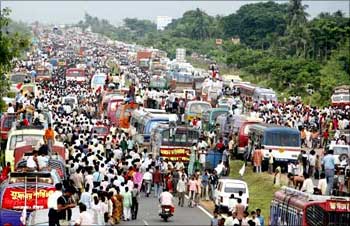
Do you think a change in governance will help improve employment in the state?
Once again, it is too soon to predict anything. Let's see how things unfold themselves in the next few months. Unemployment is a grave problem. It cannot be solved overnight. But, if one has a positive intent, I don't see any reason why things should not look up.
Whichever party wins the Assembly election, it must do something so that talent does not move out of Bengal.
One needs to focus on education and employment so that people like me won't need to send their sons and daughters abroad for higher studies or better jobs.
Moving to the national economic scenario, do you think India has been successful in combatiing the meltdown?
Yes. Actually, a majority of the Indian population did not get affected by the slowdown. It was a blessing in disguise for us. Therefore, when the United States and the rest of the world were groping for support to tide over the crisis, Indians were sleeping rather easy.

The International Monetary Fund recently sold 200 metric tonnes of gold to the Reserve Bank of India. Isn't this a major achievement. . .?
Let's not read too much into this incident. Things like this keep happening in every economy. Selling and buying are but essential components of any trade.
And though we tend to attach too much of significance to the precious yellow metal, we should not forget that gold is just a commodity. Therefore, we should simply take the purchase and sale of gold between RBI and IMF in our stride and move on.
From now on, India will present inflation figures on a monthly basis instead of the existing weekly system. Your comments.
This is a welcome change. While most of the developing countries have been taking consumer price index as the yardstick for measuring inflation, we stuck to the less realistic wholesale price index to gauge inflation.
The change that the Indian government has opted for will surely give a more realistic picture to the masses.